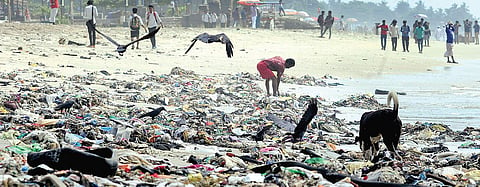

KOCHI: While Cyclone Ockhi devastated life on the Kerala coast last year, it has also left the marine ecosystem shaky. The 80 tonnes of plastic waste accumulated in the coastal areas is a definite reminder of the threat to the marine ecosystem.With the United Nations stressing on the need to address plastic pollution as part of the World Environment Day on Tuesday, it is important that all concerned join hands to battle the common villain - pollution.
The problem
Coastal litter impacts in multiple ways; most importantly, they degrade the quality and health of oceans, damage coastal and marine habitats and marine biota. Plastics enter the coastal and marine ecosystem either directly - by illegal dumping, or accidental loss of debris during fishing or cargo operations, oil rigs - or indirectly; by way of wind, rivers, streams, and storm drains.
Solid waste management has been a great challenge as affluence and consumption are closely related. Increasing urbanisation and coastal settlements, as well as tourism development, have resulted in the unprecedented production of environmental waste. “In most coastal villages, there are no programmes for proper solid waste management. Though bio-waste treatment provisions are prevalent, no one takes the initiative for non-degradable wastes,” said Principal Scientist, V Kripa, Centre for Marine Fisheries Research Institute (CMFRI).
Shrinking resources
The Kerala coastal waters back in the 1950s and 70s were famous for its shrimp resources which have declined in recent years since the water flow has come down to less than 50 per cent from the original, causing the habitat destruction of shrimps.
The young ones of shrimps come to coastal waters for growing up and with the decrease in their numbers; shrimp seeds are unavailable in large quantities. This has affected the fisheries as well as shrimp farmers.
“Even the stake nets used by fishermen to catch fish were found to have a huge quantity of marine litter, from 80 to 90 per cent. Even if the litter is collected, there is no place to dispose of these wastes and, therefore, these litters find their way back to the water,” said Kripa.
Clean-up measures
The state government took the initiative to launch the Suchitwa Sagaram project, intended to not only stop dumping of plastic waste into the sea but also collect and bring back to the shore all plastic materials that got entangled in the nets. CMFRI started a programme, Nirmal Dhara in the villages of Mulavukad, where the villagers are given proper awareness and training about waste management and in cleaning the coastal areas.
As part of cleaning up coastal zones, the Pollution Control Board - with the support of various departments, including the Coast Guard and the Cochin Port Trust - will launch ‘shoreline clean-up’.
“Within a month, we will be launching the shoreline clean-up programme to lessen the pollution affecting the coastal areas,” said M A Baiju, Chief Environmental Engineer, Pollution Control Board.